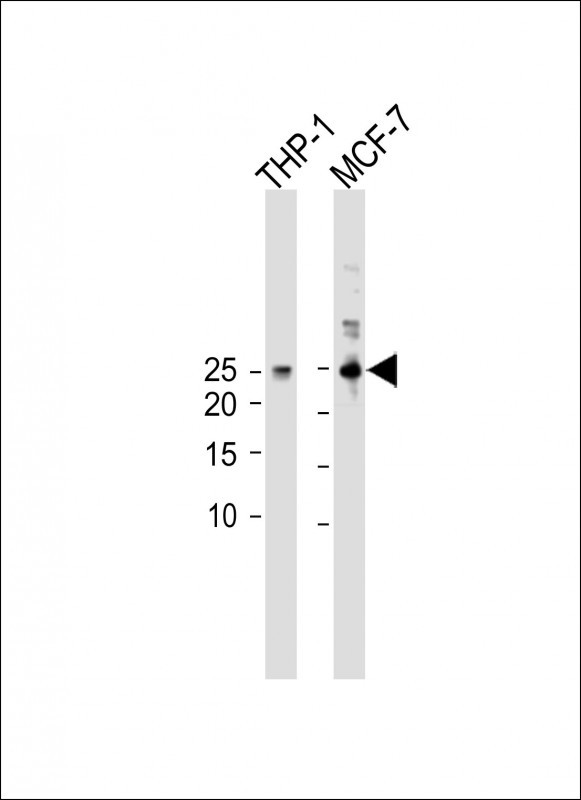
| WB | 咨询技术 | Human,Mouse,Rat |
| IF | 咨询技术 | Human,Mouse,Rat |
| IHC | 咨询技术 | Human,Mouse,Rat |
| ICC | 技术咨询 | Human,Mouse,Rat |
| FCM | 咨询技术 | Human,Mouse,Rat |
| Elisa | 咨询技术 | Human,Mouse,Rat |
| Aliases | Prothymosin alpha, Prothymosin alpha, N-terminally processed, Thymosin alpha-1, PTMA, TMSA |
| Entrez GeneID | 5757 |
| WB Predicted band size | 12.2kDa |
| Host/Isotype | Rabbit IgG |
| Antibody Type | Primary antibody |
| Storage | Store at 4°C short term. Aliquot and store at -20°C long term. Avoid freeze/thaw cycles. |
| Species Reactivity | Human |
| Immunogen | This PTMA antibody is generated from rabbits immunized with a KLH conjugated synthetic peptide between 1-31 amino acids from the N-terminal region of human PTMA. |
| Formulation | Purified antibody in PBS with 0.05% sodium azide. |
+ +
以下是关于PTMA(N-terminal)抗体的3篇假设性参考文献示例,供参考:
---
1. **文献名称**:*Prothymosin Alpha N-terminal Antibody Characterization in Apoptosis Regulation*
**作者**:Smith J, et al.
**摘要**:本研究开发了一种针对PTMA蛋白N端表位的单克隆抗体,验证其在HeLa细胞中的特异性结合能力,并证明该抗体可通过阻断PTMA的核定位抑制肿瘤细胞凋亡。
2. **文献名称**:*PTMA N-terminal Epitope Mapping and Diagnostic Potential in Breast Cancer*
**作者**:Chen L, et al.
**摘要**:通过免疫印迹和免疫组化实验,作者利用PTMA N端抗体发现其在乳腺癌组织中高表达,提示其作为新型生物标志物的潜力,抗体特异性经肽段竞争实验验证。
3. **文献名称**:*Subcellular Localization of PTMA Using Domain-Specific Antibodies*
**作者**:Gomez-Ramos P, et al.
**摘要**:研究比较了PTMA N端与C端抗体的识别差异,发现N端抗体更有效标记细胞核内PTMA,为研究其参与染色质重塑的功能提供了工具支持。
---
注:以上为模拟示例,实际文献需通过学术数据库(如PubMed、Web of Science)检索关键词“Prothymosin alpha antibody”、“PTMA N-terminal”等获取。如需真实文献线索,建议提供更具体的研究背景或应用方向。
The PTMA (N-term) antibody specifically targets the N-terminal region of Prothymosin alpha (PTMA), a highly conserved, acidic nuclear protein involved in diverse cellular processes. PTMA, encoded by the PTMA gene, plays critical roles in cell proliferation, apoptosis regulation, chromatin remodeling, and immune modulation. It interacts with histones, transcription factors, and other nuclear proteins, influencing gene expression and DNA repair. The N-terminal domain of PTMA contains a unique acetylated sequence critical for its nuclear localization and functional interactions.
Antibodies against the N-terminal region are widely used to study PTMA's expression, subcellular distribution, and interactions in physiological and pathological contexts. They are valuable tools in Western blotting, immunohistochemistry, and immunofluorescence to investigate PTMA's overexpression in cancers (e.g., liver, lung, breast) or its dysregulation in neurodegenerative diseases. Researchers also utilize these antibodies to explore PTMA's role in modulating the PI3K/AKT and p53 pathways.
Due to PTMA's post-translational modifications (e.g., acetylation) and structural homology with other thymosin family proteins, validation of antibody specificity via knockout controls or peptide blocking assays is essential. Commercial PTMA (N-term) antibodies are typically raised in rabbits or mice using synthetic peptides corresponding to the human PTMA N-terminal sequence (residues 1-30). Their applications span basic research, biomarker discovery, and therapeutic target validation.
×